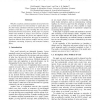Free Online Productivity Tools
i2Speak
i2Symbol
i2OCR
iTex2Img
iWeb2Print
iWeb2Shot
i2Type
iPdf2Split
iPdf2Merge
i2Bopomofo
i2Arabic
i2Style
i2Image
i2PDF
iLatex2Rtf
Sci2ools
ASUNAM
2009
IEEE
2009
IEEE
Networks Evolving Step by Step: Statistical Analysis of Dyadic Event Data
With few exceptions, statistical analysis of social networks is currently focused on cross-sectional or panel data. On the other hand, automated collection of network-data often produces event data, i. e., data encoding the exact time of interaction between social actors. In this paper we propose models and methods to analyze such networks of dyadic events and to determine the factors that influence the frequency and quality of interaction. We apply our methods to empirical datasets about political conflicts and test several hypotheses concerning reciprocity and structural balance theory.
Related Content
| Added | 18 May 2010 |
| Updated | 18 May 2010 |
| Type | Conference |
| Year | 2009 |
| Where | ASUNAM |
| Authors | Ulrik Brandes, Jürgen Lerner, Tom A. B. Snijders |
Comments (0)

